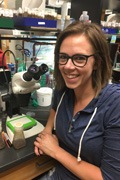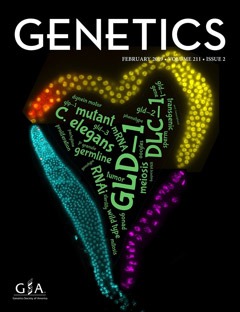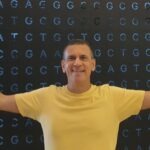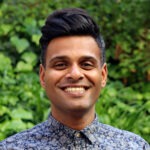2023 Election Candidates and Ballot
To cast your vote, you will need to log in at the link below using your GSA membership email address and password.
- View the candidates’ statements
- Click the “Access Ballot” button below
- Click “Log-in” in the upper right corner to log into your account
- Click on “More” under the heading “2023 Board Election”
- Click “Apply”
- Vote for your chosen candidates
- Click “Mark as Complete”
You will receive an email confirming your ballot has been submitted (please check the spam folder). If you have technical difficulties, email society@genetics-gsa.org.
Deadline to vote: November 27, 2023 at 11:59 p.m. EST.
Candidate Statements and Biographical Information
Read each candidate’s statement and biographical information at the links below. Return to this list using the “Return to Top” links.
Directors
Vote for one in each section
Director 1
Director 2
Director 3
David Greenstein
Professor, University of Minnesota
Candidacy Statement
I am deeply honored and excited to be a candidate for the position of Vice President of the Genetics Society of America. Now is an exciting and important time to be a geneticist. Life on Earth faces inordinate challenges, and our species faces existential threats largely of our own making. Although genetics and genomics will not provide all the needed solutions, our discipline will continue to have major impacts for medicine, agriculture, education, and understanding of our humanity. For the foreseeable future, genetics will remain the fundamental biological science. Nonetheless, our field faces challenges that are limiting the potential impact of our discipline for bettering our world. I would like to see GSA play a more central role in sustaining and elevating our discipline at a global level. I believe a priority should be recruiting, mentoring, training, and promoting the careers and professional development of the next generation of geneticists worldwide. An essential part of this effort will be to knock down barriers that have limited past efforts to build a diverse, equitable, and inclusive community. In addition, I think GSA has an important role to play in effectively communicating to the public to improve scientific understanding and in advocating for public support of fundamental research. Clearly, the changing landscape of scientific publishing is another looming challenge for the Society. I have confidence that the ongoing efforts to adapt to the evolving publishing climate by expanding the scope and impact of our journals will ultimately prove successful because of the importance of peer-edited society journals. Yet I see many opportunities for the Society to provide value to our members by promoting community building, career development, and fostering a culture that broadens the reach and impact of our journals, meetings, and scientific contributions.
I am seeking this role to represent our community as a developmental geneticist with a broad range of experience. My research program is focused on understanding the genetic control of germline development in C. elegans. I am passionate about teaching and mentoring. In addition to teaching a course in genetics and genomics to graduate students, I direct two NIH-funded training programs: a predoctoral T32 training program in genetics and genomics and the Minnesota IRACDA Program, which is a collaboration between the University of Minnesota and nearby community colleges. My administrative experience comes from serving as the Associate Dean for Research and the Interim Dean at my institution. I have taken on these administrative roles while running an active research laboratory and remaining active at the bench myself. I have served GSA in several capacities: I have been a member of the editorial board of GENETICS since 2006; I chaired the search committee for the Editor-in-Chief of GENETICS; and I served as the Secretary of the society from 2016 to 2018. As GSA Secretary, I played a key role in establishing the Peer Review Training Program, and I served on several influential committees. I am enthusiastic about continuing to work with our community to advance GSA’s missions in promoting support for research, education, and outreach.
Education
PhD in Genetics (1989) – The Rockefeller University
BA in Chemistry and Biochemistry (1983) – University of Pennsylvania
Research Interests
To complement studies in vertebrates, the Greenstein lab uses the nematode C. elegans as a model for studying the control of meiosis by intercellular signaling. Sexual reproduction relies on reciprocal soma-germline interactions, in addition to complex interactions between gametes. Our studies demonstrate that the C. elegans major sperm protein (MSP), a cytoskeletal protein required for amoeboid motility of nematode sperm, has a second critical function as a hormone that promotes oocyte meiotic maturation, ovulation, and fertilization. The MSP signal acts on both oocytes and the somatic gonad, culminating in the activation of conserved signaling cascades that promote M-phase entry, cytoskeletal reorganization, meiotic spindle assembly, and fertilization. Ongoing research is aimed at elucidating the molecular mechanisms underlying these key developmental events using a combination of molecular genetics, genomics, biochemistry, and cell biology.
Brenda Andrews
Professor, University of Toronto
Candidacy Statement
I have been inspired by the work of the Genetics Society of America since the beginning of my scientific career. I attended the GSA yeast meetings during my graduate and postdoctoral studies, and these meetings were crucial for my career development by expanding my network of colleagues and providing scientific inspiration. After starting my own lab at the University of Toronto, I became more involved with GSA, first serving as an Associate Editor for GENETICS (2000-2010) and then founding Editor-in-Chief of G3: Genes|Genomes|Genetics (2011-2022). During my time as Editor-in-Chief, I assembled and led a team of 100 Senior and Associate Editors to publish one of the first open-access society journals. As an early advocate of open science, I prioritized fast, fair reviews and the importance of being responsive to what our communities wanted. This included the publication of research conducted by undergraduates and new article types like Mutant Screen Reports and Genome Reports that made it easy for authors to publish their work.
I attended GSA Board Meetings and interacted extensively with the remarkable GSA staff who oversee journal activities. Through these experiences, I learned a great deal about scientific publishing and have gained the utmost respect for the Society, the colleagues who serve on the Board of Directors, and the Society’s mission to support the genetics and genomics communities.
I have also worked with GSA in other capacities, including serving as Chair of the organizing committee for the 2008 Yeast Genetics and Molecular Biology conference (in Toronto), co-chair of the yeast community meeting at the The Allied Genetics Conference 2016, and a member of the Allied Program Committee organizing the TAGC 2024 meeting. I was also pleased to speak recently at the International Seminar Series (online, 2023) which is co-sponsored by GSA, the Latin Association of Genetics, and the International Genetics Federation.
My own research interests currently include analysis of genetic interaction networks in budding yeast and mammalian cells, using high through-put genetics platforms that include high content microscopy for systematic analysis of cell biological phenotypes. I am a University Professor and Canada Research Chair in Systems Genetics & Cell Biology in the Donnelly Centre for Cellular and Biomolecular Research and the Department of Molecular Genetics at the University of Toronto. I have considerable leadership experience at the University of Toronto, having served as Chair of the Department of Medical Genetics (now Molecular Genetics, 1999-2004) and the Banting & Best Department of Medical Research (2004-2014). I was also the inaugural Director of the Donnelly Centre, an interdisciplinary biomedical research institute focused on systems-level genetics and biology, and continued in the position until 2020.
It would be an honor to continue my association with the Society by serving as Vice President of the Board of Directors. I believe I have broad knowledge of the ongoing activities of the Society and see more opportunities for expanding the GSA profile internationally, including outreach to scientists in geographic regions underserved by major societies. The current International Seminar Series and this year’s International C. Elegans Conference in Glasgow are great examples of international outreach, and these types of activities should be expanded.
I will also prioritize support for early- and mid-career researchers, in recognition of the challenges they face. GSA can help scientists through providing mentorship, training, and increased advocacy efforts whether for funding or communicating the value of basic research. It is important that the ‘next generation’ of scientists see value in the activities supported by the Society, including our journals, which face challenges in light of the rapidly evolving landscape of academic publishing. Here, we must continue to foster relationships with authors, improving the visibility of their work and helping to raise the profiles of our journals. All of our work must be considered in the context of GSA’s ongoing commitment to inclusivity. Here, the Society may wish to work with other groups to enable access to genetics and genomics research by young people from under-represented groups. I found that a program I started at the Donnelly Centre that supported visits to labs by local high school classes from less privileged parts of Toronto was very impactful.
Times have changed and so must GSA. I hope to learn from and listen to you as we shape GSA together.
Education
PhD in Medical Biophysics (1986) – University of Toronto
BS in Zoology (1980) – University of Toronto
Research Interests
We are interested in understanding cellular signaling processes and genetic networks in budding yeast using functional genomics, high content screening and gene expression tools. Current projects in the lab include: using synthetic genetic array (SGA) technology, combined with a variety of libraries of yeast strains, to screen for genetic interactions; using SGA combined with high content screening (HCS) to assess changes in protein localization and abundance under a variety of genetic, environmental and chemical stresses with rapid image acquisition and analysis; and pioneering the use of SGA for genome wide analysis of reporter gene-expression, particularly for studying transcriptional changes throughout the cell cycle.
Antonio Augusto Franco Garcia
Associate Professor, University of São Paulo
Candidacy Statement
First, I am honored to present my candidacy for a relevant and respected society like GSA. Let me say a few words about my background and how this influenced my view of the importance of science education for the progress of society and humankind. I was born in São Paulo, Brazil, and I grew up in an agricultural neighborhood of a rural city near Piracicaba.
I came from an impoverished family and entered one of the best universities in Brazil through a scholarship that I received from being selected as an outstanding student. I soon realized that I loved genetics and wanted to dedicate my life as a scientist and professor. It has always been clear that science education can change people’s lives and help the country develop. It changed mine.
Let me briefly mention some of my scientific achievements. I helped to advance the knowledge of the genetic basis of heterosis for allogamous and autogamous species. I developed methods and software for building linkage maps and implementing the mapping of genes related to variation of quantitative traits, thus raising the efficiency of breeding programs. I developed methods and strategies for genotyping, building linkage maps, and implementing molecular breeding in autopolyploid species. When I started working on this around 20 years ago, there were just a few strategies for autopolyploid species. This work would be essential for Brazil and could lead to new advances for less-studied species in developing countries and worldwide. However, they needed to catch up regarding genetic resources, mainly because their genomes are more complex and hard to study.
Back then, when I pondered how to conduct my career, I was thinking not just about advancing my CV but about how I could contribute with discoveries to advance the field of genetics. Sharing these advances with students in developing countries has always been essential to my activities and aligns with GSA’s goal of improving lives through discoveries and education.
But I must include a few words about more things I did. I trained a relevant number of graduate students, introduced undergrads to advanced genetic studies, organized events in Brazil inviting world-class scientists to interact with Brazilian scientists and students, and gave talks and short courses in several countries in South America. Of course, I also participated in major conferences and collaborated with scientists in other parts of the world.
When I saw the possibility of running for the GSA Board of Directors, I did not hesitate. Considering the relevance and broader audience that GSA can reach, this would amplify the reach of my initiatives. And I believe I can contribute to GSA as well, given my previous experience and achievements. If elected, I would use the best of my abilities and energy to help GSA advance its noble mission of advancing genetics, scientific education, and quality of life worldwide. My professional relations with geneticists in South America and several other countries could add to GSA by broadening its scope and initiatives.
Education
PhD in Genetics and Plant Breeding (1998) – University of São Paulo
BA in Agronomy (1990) – University of São Paulo
Research Interests
My research goals include understanding the genetic architecture of quantitative traits through linkage and QTL mapping, association mapping, and genomic selection. I want to help the implementation of efficient methods of molecular breeding, ensuring food and energy security for mankind.
I also want to provide well-trained and high-quality scientists for society. To achieve this, I coordinate a Statistical Genetics Lab, and my Lab currently has 8 PhD students, 2 MS students, and 9 undergrads. I have former students working in excellent universities, research centers, and private companies.
Arun Sethuraman
Associate Professor, San Diego State University
Candidacy Statement
I am honored to be nominated to the GSA Board of Directors. I have served as an Associate Editor at G3: Genes|Genomes|Genetics since 2017 and on GSA’s Conference Committee since 2021 as a representative of the population, evolutionary, and quantitative genetics group, and my work includes contributions to a recent training grant submitted to fund early-career and historically excluded geneticists attending TAGC 2024. I look forward to continuing to serve the GSA membership in an active Directorial role. As an early-career researcher at a Minority Serving Institution, I see this as an invaluable opportunity for me to be the voice of a largely underrepresented group of researchers in the Society. I am thrilled to have this opportunity to join a dedicated and diverse team of geneticists, editorial board members, and Society staff who are actively working to change the face and representation of our field.
My commitment to serving on GSA’s Board comes with a push to address five key issues that are close to my heart: (1) developing important training resources to actively involve undergraduates in genetics and genomics research as part of GSA’s catalog of activities and conferences; (2) changing how we teach fundamentals of genetics with exclusionary language by organizing a GSA community-wide effort to crowdsource and develop a new teaching paradigm for topics such as transmission, sex determination, polygenic selection, and genome-wide association studies; (3) interfacing with the equity and inclusion and conference committees in continuing to assess GSA’s membership demographic to build actionable items to increase participation of a diverse audience at all GSA conferences and to recruit and train a diverse group of editors, reviewers, and members; (4) actively featuring methods tutorials and blurbs of published work on the Genes to Genomes blog, specifically highlighting the work of early-career researchers, graduate and undergraduate students; and (5) increasing GSA’s representation at undergraduate and minority-focused conferences (e.g. SACNAS meetings, ABRCMS, Beckman Symposia).
Education
PhD in Bioinformatics and Computational Biology (2013) – Iowa State University
BEng in Computer Science (2007) – Birla Institute of Technology and Science
Research Interests
I am a theoretical and applied population geneticist who develops new statistical methods, software, and pipelines for estimating evolutionary history from large population genomic data. My lab at San Diego State University is specifically interested in the genomics of structured populations, with ongoing methodological developments to estimate population structure in the presence of missing genomic data, signatures of linked natural selection versus adaptive introgression, archaic introgression, and relatedness in admixed populations. Methods we have recently developed include PPP, InRelate, IMa2p, IMGui, and MULTICLUST. My lab is currently also working on several applied genomics projects to study the evolutionary history of domestication in hops (Humulus lupulus L.), the genomics of invasiveness in introduced beneficial insects (e.g. Coccinellid beetles) and agricultural pests (e.g. pink stem borer moths), and the evolution of modern human genomes in the face of “ghost” hybridization. My work has been graciously supported by the NSF (CAREER-2021, ABI-2016, REU-2018), USDA-NIFA (REEU-2017, HSI-2022), and NIH (R15-2022).
Hannes Bülow
Professor, Albert Einstein College of Medicine
Candidacy Statement
I am running for the Board of Directors to support and advance the mission of the Genetics Society of America. One cause that holds a special place in my heart is the advocacy for and professional development of young scientists from backgrounds traditionally underrepresented in the sciences. Notably, over half of the PhD students I have mentored to date have come from such backgrounds and all of them now work in science-related fields. I plan to bring this experience and commitment to diversity and inclusion to the board of directors. I also strongly believe in a collaborative approach to science. Over the years I have been fortunate enough to work together with geneticists both nationally and internationally, as well as across disciplinary boundaries. Some of my most rewarding experiences in the field have come from these collaborations that crossed disciplines. In my role as an academic editor for society journals, I have helped directly to communicate scientific advances, a role I plan to continue. If elected, a special focus of mine would be to further engage with the broader public. Communicating not only the importance but also the potential rewards of genetics research are a top priority. Fostering a broader understanding will be paramount for continued support of the public for the efforts of the society and the wider genetics community. I am excited to serve on the Board of Directors and help shape the future of the Society.
Education
PhD in Molecular Biology (1998) – Humboldt University of Berlin
BS in Pharmacy (1992) – Albert Ludwig University of Freiburg
Research Interests
My lab uses the small nematode C. elegans with its simple and well characterized nervous system as a genetic model. We are trying to understand how growing axons and dendrites navigate the extracellular space to connect to their partners and be appropriately patterned. In addition, we are investigating how an animals experience affects connectivity, i.e. hardwiring of its nervous system.
In one project we are studying the development of dendrites in polymodal multidendritic neurons of C. elegans. We are aiming to understand how the complex dendritic arbors that resemble menorah-like candelabras are patterned. Of particular interest are the mechanisms and molecules that promote or restrict the growth of dendrites both cell-autonomously and non-cell-autonomously. In a second project, we are investigating development and function of the connectome, i.e. the hardwiring of the nervous system. Specifically, we are interested in how an animal’s experience can influence and change connectivity. To this end, we have developed methods to visualize cell-specific synaptic connections. We are now using a combination of genetic, behavioral, and imaging approaches to test how specific connections changes in response to the environment and which genes mediate these processes.
Jason Stajich
Professor, University of California, Riverside
Candidacy Statement
I am honored to be nominated for an opportunity to serve on the Board of Directors of GSA. The Society has enabled many opportunities in my career, and I am eager to contribute back. I first became a GSA member in graduate school and was completely hooked on the community and research after attending my first Fungal Genetics conference. I have served as an Associate Editor at GENETICS since 2018, and previously contributed to conferences by sitting on the Neurospora and Fungal Genetics Policy Committees. I am currently a Professor in the Department of Microbiology and Plant Pathology where I have taught in the fields of Genomics, Microbiology, and Bioinformatics for the past 14 years. I currently serve as Vice Chair of my department and previously have served the campus faculty as Chair of the Academic Senate and as chair of the Graduate Council. I am excited for the possibility to contribute to the GSA community as a Director to contribute to the Society’s efforts in building training and mentorship for early career scientists, help shape the advocacy for science and genetics in funding and policy decisions, and provide perspectives on the community’s needs to advance new research systems and questions.
As a member of the Board, I would continue to champion the value and importance of diverse research systems and diverse research communities to address fundamental understandings of genetics and biology. I am an omnivore of biological research systems and believe there are strengths in a collection of computational and experimental approaches across a variety of organisms. My own draw to science was found in the satisfaction of problem solving, and I will contribute my efforts to the Society as we consider different problems such as the public perception of science, retaining and recruiting a broad representation of individuals to work in our field, or the creativity needed in how societies navigate changes in journal publication strategies. The GSA journals have been a home for my publications and the conferences and members have been a strong and supportive community for my research and development. If elected, I would dedicate the time and energy to help sustain and grow our society.
Education
PhD in Genetics and Genomics (2006) – Duke University
BS in Computer Science (1999) – Duke University
Research Interests
We study evolution in a broad range of Fungi with a focus on genome evolution, population biology, and phylogenetics to better including human pathogenic molds (Aspergillus, Coccidioides) and yeasts (Candida), model system fungi (Neurospora). The research also explores fungi from ecologically diverse environments like zoosporic chytrid fungus Batrachochytrium and zygomycete fungi Rhizopus or the amphibian associated Basidiobolus. We use genome sequencing and analyses to test hypotheses of evolution around pathogenicity, adaptation to extreme environments, and symbioses. To approach these questions we build tools, databases, and contribute new methods to the analysis and interpretation of these genomic data.
Eyleen O’Rourke
Associate Professor, University of Virginia
Candidacy Statement
I am excited to announce my candidacy for a position on the GSA Board. With a passion for genetics and a commitment to advancing our field, I am eager to contribute my skills, experience, and dedication to the society’s mission.
My academic journey encompasses undergraduate studies at a small university in Northern Argentina, followed by a PhD experience across four labs in three different countries (Argentina, France, and the United States). Throughout this journey, I’ve witnessed the profound impact of genetics research. Genetics has not only shaped my career but, more importantly, it has the potential to deepen our understanding of life systems and their evolutionary history, and address some of the most pressing challenges that humans face today.
My candidacy is grounded in three core principles:
- Advancing Genetics Research: I believe that supporting and promoting cutting-edge genetics research is core to our society’s mission. If elected, I will actively foster collaboration and knowledge sharing among GSA members. I propose initiatives such as promoting the selection of unpublished work for oral presentation at GSA-organized conferences. Additionally, I will advocate for increased research funding and opportunities, catering to the needs of both early-career and established researchers.
- Education and Outreach: Genetics should transcend the confines of the laboratory. In an era where the public does not trust lifesaving vaccines, I am committed to enhancing the society’s educational initiatives. I will work on programs that promote genetics literacy and support science education at all levels. By bridging the gap between scientific discoveries and public understanding, we can strengthen our society’s impact.
- Diversity and Inclusion: Science works at its best when it reflects the diversity of our broader community. As a first-generation high-school graduate and Latina, I have dedicated the past decade to learn, teach, and champion inclusive research and teaching practices. I have promoted minorities both locally and internationally. I pledge to carry this dedication into GSA, advocating for programs that support underrepresented groups and nations in genetics. I will work diligently to foster an inclusive environment where every voice is not only heard but valued.
I bring to this role a strong background in molecular genetics research, having published in reputable journals, and presented my work at national and international conferences. Additionally, my experience as a teacher and mentor has enriched my understanding of the educational needs within our community.
If elected to the GSA Board, I pledge to collaborate with fellow board members and the broader GSA membership to advance our shared goals. I will listen to your feedback, actively seek your input, and work hard to represent your interests. I humbly request your support in this endeavor. Together, we can advance genetics research, education, and inclusivity. Thank you for considering me as your candidate, and I look forward to the opportunity to serve you.
Education
PhD in Biochemistry – University of Buenos Aires
BS in Genetics – National University of Misiones
Research Interests
The long-term goal of our research program is to identify intervention points to break the link between obesity and age-related disease. We harness the power of C. elegans genetics for discovery and mechanistic insights, while employing mice and cultured human cells for translational aspects. The combination of experimental testing in these model systems with computational modeling enables us to dissect the intricate relationship between fats and aging.
Our work has unveiled a more complex relationship between fat and aging than just more fat leads to early onset of age-related diseases and premature death. Enriching specific lipid profiles and signals may actually postpone the onset of disease and aging.
Elisabeth Marnik
Assistant Professor, Husson University
Candidacy Statement
I am honored to be nominated as a candidate for the GSA’s Board of Directors. My journey with the Society began when I joined as a postdoctoral researcher. I instantly felt at home among its members. In 2019, I joined the Childcare at Conferences Committee, aiming to help with the childcare plan for the TAGC 2020 meeting. Though the meeting didn’t occur in person, the committee’s camaraderie and support were invaluable to me, especially as a new mom. In 2020, I became part of the GSA’s Early Career Leadership Program. In this capacity I assisted with virtual workshops and co-writing articles for the Communication and Outreach Committee. Once I transitioned to a faculty position, I was selected to serve as the faculty advisor for this same ECLP committee. I have served as faculty advisor for three years. I am also a current member of the GSA’s Public Outreach and Communications Committee where I have helped with the beginning stages of building resources for members to use to help them engage with the public. These experiences serving the Society have enriched my life, and they have solidified my passion for this community of scientists. I would be honored to continue to be a part of this community by serving on the Board of Directors.
My scientific journey started at Central Connecticut State University, where I earned a Bachelors in Biochemistry. During my undergraduate research with Thomas King, I used genetic mapping to identify mutations causing hair defects and skin graft incompatibility in mouse lines. Then I began my graduate studies in a collaborative mammalian genetics PhD program between Tufts University and The Jackson Laboratory. Under Derry Roopenian’s mentorship, I employed genetically engineered mouse models to investigate the role of T-follicular helper cells and IL21 in autoimmune disease. This period solidified my passion for science education and outreach and revealed my desire to integrate research into education. This prompted my switch to using C. elegans for my postdoctoral work. I joined the lab of Dustin Updike where I focused on germ granules and their role in maintaining germline pluripotency. Presently, I serve as an assistant professor at Husson University, which is a primarily teaching university. I teach a variety of undergraduate science courses while incorporating my C. elegans research into the classroom.
If elected to the GSA Board, I am eager to contribute to its mission of supporting researchers at all career stages, encouraging public engagement and fostering diversity. My particular passion lies in bolstering support for early-stage scientists, especially undergraduates. Research indicates that while students of all races initially pursue STEM majors at similar rates, Black and Latino students drop out at nearly twice the rate of white students. To address this disparity, I propose enhancing access to diversity, equity, and inclusion training for GSA members and developing resources to assist your work with undergraduates. Additionally, I am an active science communicator, both on social media and in-person. I deeply value the importance of engaging with the public. As the anti-science movement increases globally it is even more important that scientists at all stages are equipped to engage with the public in a way they can understand. As a board member with expertise in this area, I would continue to assist the Socieety in expanding its resources, training, and materials to empower scientists to effectively communicate with the public, furthering our collective impact.
Education
PhD in Mammalian Genetics (2016) – Tufts University
BS in Biochemistry (2011) – Central Connecticut State University
Research Interests
My research primarily focuses on investigating proteins found within the C. elegans germ granule to understand their role in maintaining germline totipotency. I am drawn to this research for two reasons: First, there is still much to uncover regarding the contributions of germ granule proteins in maintaining totipotency. Exploring these factors could potentially enhance our ability to generate more effective induced pluripotent stem cells. Secondly, existing research suggests that the expression of germ plasm components in somatic cells might play a role in cancer development and progression. If we have a better understanding of how germ granule proteins function then we can begin to learn what properties they may be providing in the context of cancer. My prior work involved characterizing a novel protein in C. elegans, known as LOTR-1, and identified a complex of proteins associated with it. Currently, my undergraduate students are working on this project.











